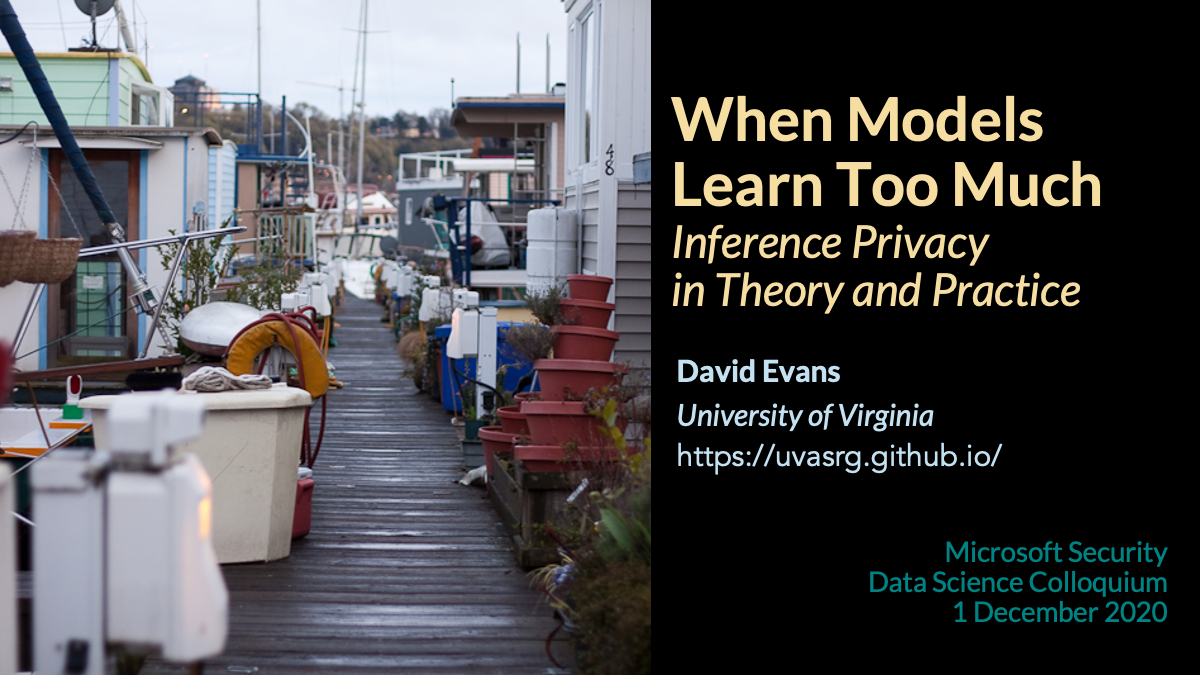David Evans, professor of computer science in the University of Virginia School of Engineering and Applied Science, is leading research to understand how machine learning models can be compromised.
Model-Targeted Poisoning Attacks with Provable Convergence
(Post by Sean Miller, using images adapted from Suya’s talk slides)
Data Poisoning Attacks
Machine learning models are often trained using data from untrusted sources, leaving them open to poisoning attacks where adversaries use their control over a small fraction of that training data to poison the model in a particular way.
Most work on poisoning attacks is directly driven by an attacker’s objective, where the adversary chooses poisoning points that maximize some target objective. Our work focuses on model-targeted poisoning attacks, where the adversary splits the attack into choosing a target model that satisfies the objective and then choosing poisoning points that induce the target model.
ICLR DPML 2021: Inference Risks for Machine Learning
I gave an invited talk at the Distributed and Private Machine Learning (DPML) workshop at ICLR 2021 on Inference Risks for Machine Learning.
The talk mostly covers work by Bargav Jayaraman on evaluating privacy in machine learning and connecting attribute inference and imputation, and recent work by Anshuman Suri on property inference.
How to Hide a Backdoor
The Register has an article on our recent work on Stealthy Backdoors as Compression Artifacts: Thomas Claburn, How to hide a backdoor in AI software — Neural networks can be aimed to misbehave when squeezed, The Register, 5 May 2021.
Codaspy 2021 Keynote: When Models Learn Too Much
Here are the slides for my talk at the 11th ACM Conference on Data and Application Security and Privacy:
The talk includes Bargav Jayaraman’s work (with Katherine Knipmeyer, Lingxiao Wang, and Quanquan Gu) on evaluating privacy in machine learning, as well as more recent work by Anshuman Suri on property inference attacks, and Bargav on attribute inference and imputation:
- Merlin, Morgan, and the Importance of Thresholds and Priors
- Evaluating Differentially Private Machine Learning in Practice
“When models learn too much. “ Dr. David Evans @UdacityDave of University of Virginia gave a keynote talk on different inference risks for machine learning models this morning at #codaspy21 pic.twitter.com/KVgFoUA6sa
CrySP Talk: When Models Learn Too Much
I gave a talk on When Models Learn Too Much at the University of Waterloo (virtually) in the CrySP Speaker Series on Privacy (29 March 2021):
Abstract Statistical machine learning uses training data to produce models that capture patterns in that data. When models are trained on private data, such as medical records or personal emails, there is a risk that those models not only learn the hoped-for patterns, but will also learn and expose sensitive information about their training data. Several different types of inference attacks on machine learning models have been found, and methods have been proposed to mitigate the risks of exposing sensitive aspects of training data. Differential privacy provides formal guarantees bounding certain types of inference risk, but, at least with state-of-the-art methods, providing substantive differential privacy guarantees requires adding so much noise to the training process for complex models that the resulting models are useless. Experimental evidence, however, suggests that inference attacks have limited power, and in many cases a very small amount of privacy noise seems to be enough to defuse inference attacks. In this talk, I will give an overview of a variety of different inference risks for machine learning models, talk about strategies for evaluating model inference risks, and report on some experiments by our research group to better understand the power of inference attacks in more realistic settings, and explore some broader the connections between privacy, fairness, and adversarial robustness.
Improved Estimation of Concentration (ICLR 2021)
Our paper on Improved Estimation of Concentration Under ℓp-Norm Distance Metrics Using Half Spaces (Jack Prescott, Xiao Zhang, and David Evans) will be presented at ICLR 2021.
Abstract: Concentration of measure has been argued to be the fundamental cause of adversarial vulnerability. Mahloujifar et al. (2019) presented an empirical way to measure the concentration of a data distribution using samples, and employed it to find lower bounds on intrinsic robustness for several benchmark datasets. However, it remains unclear whether these lower bounds are tight enough to provide a useful approximation for the intrinsic robustness of a dataset. To gain a deeper understanding of the concentration of measure phenomenon, we first extend the Gaussian Isoperimetric Inequality to non-spherical Gaussian measures and arbitrary ℓp-norms (p ≥ 2). We leverage these theoretical insights to design a method that uses half-spaces to estimate the concentration of any empirical dataset under ℓp-norm distance metrics. Our proposed algorithm is more efficient than Mahloujifar et al. (2019)’s, and experiments on synthetic datasets and image benchmarks demonstrate that it is able to find much tighter intrinsic robustness bounds. These tighter estimates provide further evidence that rules out intrinsic dataset concentration as a possible explanation for the adversarial vulnerability of state-of-the-art classifiers.
Microsoft Security Data Science Colloquium: Inference Privacy in Theory and Practice
Here are the slides for my talk at the Microsoft Security Data Science Colloquium:
When Models Learn Too Much: Inference Privacy in Theory and Practice [PDF]
The talk is mostly about Bargav Jayaraman’s work (with Katherine Knipmeyer, Lingxiao Wang, and Quanquan Gu) on evaluating privacy:
- Merlin, Morgan, and the Importance of Thresholds and Priors
- Evaluating Differentially Private Machine Learning in Practice
Adversarially Robust Representations
Post by Sicheng Zhu
With the rapid development of deep learning and the explosive growth of unlabeled data, representation learning is becoming increasingly important. It has made impressive applications such as pre-trained language models (e.g., BERT and GPT-3).
Popular as it is, representation learning raises concerns about the robustness of learned representations under adversarial settings. For example, how can we compare the robustness to different representations, and how can we build representations that enable robust downstream classifiers?